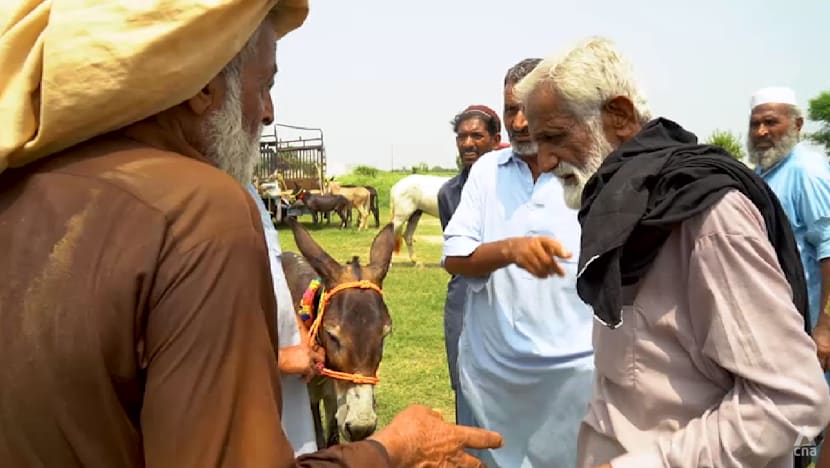Pakistan bets on donkeys to revive sluggish economy amid soaring Chinese demand
Surging demand from China has driven up prices in local markets, creating windfalls for traders but also sparking concerns over animal welfare and illegal slaughter practices.

Pakistan is banking on an unlikely export to help revive its struggling economy: donkeys.

This audio is generated by an AI tool.
GONDAL, Pakistan: Pakistan is banking on an unlikely export to help revive its struggling economy: donkeys.
Surging demand from China has driven up prices in local markets, creating windfalls for Pakistani traders.
But this has also sparked concerns over animal welfare and the rise of illegal slaughter practices.
SURGING DEMAND
Donkeys have long been the backbone of rural life, transporting goods and ploughing land.
But today, growing demand and soaring prices mean many farmers can no longer afford them.
At a donkey market in Gondal, in Punjab province, farmers gather to trade animals — one of many such markets across the country. Pakistan has the world’s third-largest donkey population, with about 5.7 million animals.
“Previously, it used to cost between 15,000 to 16,000 rupees (US$53 to US$57),” said donkey buyer Farman Ali.
“But now it can sell for as much as 35,000 rupees (US$123). Prices are soaring rapidly every time we come to the market."
Traders told CNA that demand from Chinese buyers has led to prices more than doubling over the past few months.
“When Chinese people come here, the buying of donkeys increases, which leads to high prices,” said seller Ashraf Gul.
Donkey hides are a prized ingredient in traditional Chinese medicine, food, and cosmetics, making the animals more valuable than ever.
Industry estimates suggest China needs at least 5 million donkey hides each year.
But China — the world’s largest consumer of donkey meat and hides — is facing a sharp decline in its domestic supply.
To fill the gap, it has turned to importing donkeys, with countries such as Pakistan emerging as new sources.
As demand from China grows, officials in Pakistan are rushing to set up donkey farms, hoping the beasts of burden can generate millions in exports to help revive the country’s struggling economy.
But the boom has fed concerns that unregulated donkey meat could slip into local food chains.
Authorities recently raided an unlicensed facility near Islamabad, seizing nearly 1,000kg of donkey meat and rescuing more than 50 animals.
STRONGER SAFEGUARDS
The surge in demand has also raised fears of abuse and widespread illegal slaughter.
Animal rights groups are calling for stronger safeguards.
Dr Qurat Ul Ain Shafqat, director of veterinary services at Comprehensive Disaster Response Services (CDRS), a non-profit society for humanitarian relief and social welfare work, stressed the need for a robust legal framework, saying regulations must be strong enough to prevent any form of animal abuse.
“For this, they have to keep checks and balances if they want this to work in a productive way,” she added.
Meanwhile, the Pakistani government is moving to safeguard the country’s donkeys.
Officials note that only one slaughterhouse, in the port city of Gwadar, has been approved for exports, with any slaughter outside this facility strictly prohibited.
Authorities are also cracking down on black-market sales, while plans are underway to bring stronger regulation to donkey exports.















